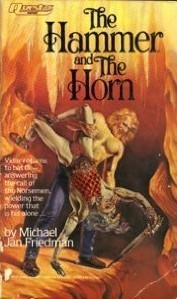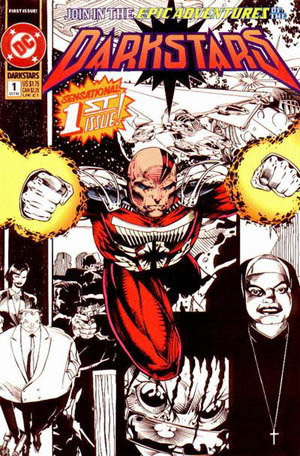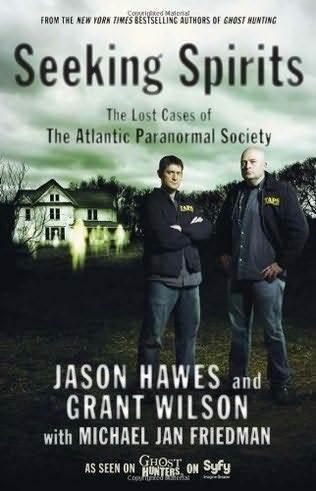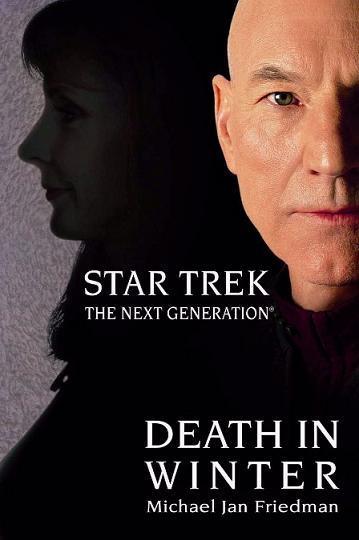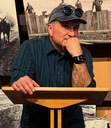Author Interview: Michael Jan Friedman - Part One
At SF conventions, Mike can often be seen entering the hotel soaked in sweat after a grueling run around the building. In that regard, Mike will always be half the man I am. That was a weight joke. Laugh, damn you.
For thirty years, Mike has written SF, Fantasy, paranormal, media tie-in, biographies, and comic books for both DC and Marvel. He is one of most prolific authors out there. So let's get talkin' to Michael Jan Friedman!
First, tell us where we can find you online such as blogs, websites, Facebook, etc.
My website can be found at MichaelJanFriedman.net. It’s got a blog. I hope to actually start putting in new entries in June, after I get a few other parts of my professional life in order. I can also be found at Crazy 8 Press--more on that later.
Your first original published fiction was a trilogy known as the Vidar Saga (The Hammer and the Horn, The Seekers and the Sword, The Fortress and the Fire). What inspired the storyline?
I’d always been a big fan of the Norse legends. Marvel’s Thor was a particular favorite of mine, but I’d actually been reading about the Norse gods even before I discovered them in the comics. I was especially interested in Ragnarok, the twilight of the gods, in that it was billed as the final battle for good and evil. And what happens after the “final” battle is over? What kinds of battles will be fought then? These are the questions that compelled me to write the Vidar Saga back in the mid-1980s. People still come over to me at cons and in book stores and tell me they just read my trilogy, and how much they enjoyed it. It’s very gratifying.
For more than two decades, you have earned recognition as a media tie-in writer beginning with your first Star Trek novel in 1988 called Double, Double. Since then, you’ve written or co-written nearly forty Star Trek novels. What was the catalyst for your enduring relationship with Trek and Pocket Books?
I remember seeing the very first episode of Star Trek back in September, 1966. I was sprawled on my bed in my pajamas, hooked by the eyeballs. Star Trek was space adventure with a heart, with compelling characters, with a sense of right and wrong that felt very much like my own. From then on, I couldn’t miss an episode.
Of course, I had been an avid science fiction reader since I was in first grade, but this was different. It wasn’t a book I’d be reading with a flashlight under the covers long after I was supposed to have gone to sleep. It was out there. It was live action. It was real.
Years later, after I had come out with the Vidar Saga and another original work, The Glove of Maiden’s Hair, my first agent hooked me up with Pocket Books. Dave Stern was the editor then. He turned down my first proposal, which was too fantasy-oriented. Then I sent in the proposal for Double, Double, he liked it, and we were on our way.
More recently, you also wrote three novels for Darkhorse (Aliens: Original Sin, The Wolfman: Hunter’s Moon, and Predator: Flesh and Blood). How did these projects come about?
Rob Simpson, whom I first met when he was an editor at DC Comics, is a friend of mine and a terrific guy. When he got the editor’s job at Dark Horse Press a few years ago, we talked and he asked me which of the franchises Dark Horse had licensed might be appealing to me. I asked if I could do an Aliens book and a Wolf Man book. I loved Aliens because I found the Ripley character so appealing (not to mention so sexy). Wolf Man got my juices flowing because I wanted to explore the Satanic side of the story. After all, Talbot had been cursed by the devil. I wanted to see how he would react if he were offered a respite from that curse.
The Predator assignment came a bit later; because I had overcommitted myself, I brought in my pal Bob Greenberger to help me with the project, and he did his usual bang-up job. The Predator book is about an organized-crime family in the future--a family that prides itself on its toughness--running up against the toughest beings of all in the form of the Predators.
I was delighted in 2007 when I learned that you were collaborating with Jason Hawes and Grant Wilson (from SyFy’s Ghost Hunters) to produce the book, Ghost Hunting. That was followed up by Seeking Spirits in 2009. How did you become involved in these projects and is there another book on the horizon?
My agent called me with the Ghost Hunters gigs. I had seen the show on SyFy and enjoyed it, so I was pleased to have the chance to work with Jason and Grant. Aside from having great stories to tell, they’re good guys to hang out with. One day we spent an hour just sitting in a trailer in Jason’s driveway looking at tapes of events they had experienced but couldn’t explain--for instance, a swinging gate that had no earthly reason to be swinging. A third Ghost Hunters book that collects the first two is on tap for later this year.
You have almost two hundred comic books under your belt from Star Trek to Batman to Flash to Silver Surfer and of course your original title, Darkstars. H ow did you get started in comics?
You can blame that on Bob Greenberger, who was the Trek editor at DC Comics for a while. Shortly after I started doing work for Pocket Books, Dave Stern held a holiday pizza party for his New York City-area writers. Bob was there. I asked him if I could do some work for him. He said there weren’t any openings at the time because he already had a guy named Peter David working on the one Trek title he was editing. However, he would keep me in mind. When DC renewed its Trek license with Paramount and added a Next Gen title, Bob took a chance and gave me the Next Gen book. I don’t think he ever regretted it. At least he’s never said so in public...
Please share with us the origins of your Darkstars series. What was the premise and how many issues were there?
Darkstars is a take off on the Green Lantern mythos. The Green Lantern Corp was created by a benevolent bunch of little blue guys with big heads who wanted to empower the exemplars of intelligent species to defend their species against evil. The Darkstars were a lot grittier, a lot less idealistic. Their organization was created by the Controllers, who selfishly wanted to keep chaos and violence as far from their civilization as they possibly could. So right from the get-go, the Darkstars were operating under a different philosophy. They defended whatever worlds they were assigned. I remember the first caption I wrote for the title character’s thoughts: “Another day, another dungheap.”
I loved writing Darkstars, although the series reads better if you go through in a single sitting than if you buy it and read it on a monthly basis. The story arcs were long, probably too long for the average comic reader, but they were different. In one issue I introduced an alien criminal who had basically turned state’s evidence and gone into a galactic witness protection program. In another issue I had the Darkstars trying to contain the growth of a tiny expanding universe in the Dallas suburbs.
Part of the thrill of working on Darkstars was the chance to take in great DC characters like Donna Troy and John Stewart who didn’t otherwise have a home at the moment. It made sense that they handled their Darkstar duties and abilities differently than did Ferrin Colos, the star of the series. In the end, Darkstars ran thirty-nine issues and was cancelled because of monthly sales that would be considered stellar (no pun intended) these days. But it was fun while it lasted.
Most of your comics work was with DC. How did you come to write for Silver Surfer (Marvel Comics)?
My friend Ron Marz was stepping away from the title to pursue other work and he knew I liked the character, so we collaborated on issues 101 and 102 of the 1980s-90s run. I had some ideas I wanted to implement for the Surfer but the editor wanted to make a clean break and gave the book to one of his fellow editors, I believe.
In the meantime, I got a chance some time later to rewrite the ultimate Surfer arc in a title called Marvel Remix, which updated classic Marvel stories. Ruben Diaz, the assistant editor on part of the Darkstars run, had left to become the editor on Remix. He wanted to retell the tale that first appeared in Fantastic Four 57-60 in which Doctor Doom steals the Power Cosmic from the Surfer. It was pretty hard to improve on Stan Lee, but I had a great time trying.
Tune in again tomorrow for Part Two when Mike talks about writing for Star Trek: Voyager, his upcoming original novel, Blood of the Gods, and the formation of Crazy 8 Press with fellow authors Bob Greenberger, Aaron Rosenberg, Howie Weinstein, Peter David, and Glen Hauman.
Michael Jan Friedman on Wikipedia
Michael Jan Friedman on Simon & Schuster
Michael Jan Friedman on the Internet Speculative Fiction Database

